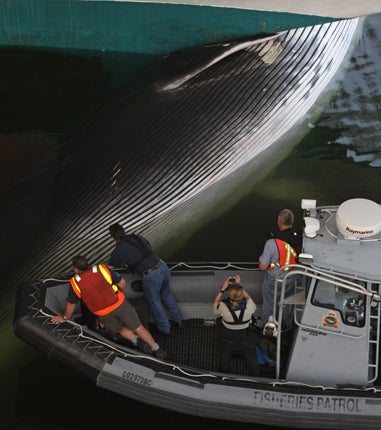70-tonne whale meets its match after collision with cruise ship
Fatal collision highlights dangers posed to wildlife by giant passenger liners

It is a bit like the hedgehog-and-car encounter, scaled-up many thousands of times: a collision where there can only be one winner.
Whales may be the world's biggest animals, but they don't stand a chance when hit by a mammoth cruise liner – as has just been proved in Canada.
When the giant vessel Sapphire Princess docked at Vancouver after a trip to Alaska, it was found to have something remarkable impaled on its bow: a fin whale, the second biggest whale species after the blue whale, and thus the second biggest animal on the planet. This example was about 70ft long and weighed about 70 tonnes.
But even such dimensions are no protection against a ship almost 1,000ft in length and weighing in at 116,000 tonnes – and that's before the passengers get on and start eating ice cream.
The Sapphire Princess may have struck the whale in Alaskan waters and carried it unknowingly wedged on the bow back to Canada.
A Vancouver harbour worker, Craig Delahunt, of Tymac Launch Service, said it was the third such ship-whale impalement he had seen. "Basically like a train coming through, it just hits them. That bow is kind of like a spear. And once they're hit by it, it probably breaks their back, kills them almost instantly," he said, adding that the skeleton from the last whale carcass is now displayed in a museum in Telegraph Cove, north of the city.
The vessel's owners, Princess Cruise Lines, said the collision remained a mystery. "It is unknown how or when this could have happened, as we have strict whale avoidance procedures in place when our ships are in the vicinity of marine life," it said in a statement.
Before the carcass was removed from the bow, many tourists came to see it or take photos; they looked on in awe. "It looks so small compared to the boat," said Ed McKeowan, 69, from Chicago. "I think it's a shame, but it's inevitable. Unfortunately, we share the sea with the whales," said Ross Harlow, 70, of Whistler, Canada.
A marine mammal response team from Canada's Department of Fisheries and Oceans used slings to pull the whale off the ship and tow it across Burrard Inlet, where it was loaded on to a barge and taken to the fisheries laboratory on Vancouver Island. A necropsy is being performed to determine whether it was alive when it was hit. "It will probably be a while to determine the cause of death and how long it had been dead," said the Fisheries and Oceans Department's Paul Cottrell. "When they die, they sink to the bottom and a whole incredible ecosystem lives off their carcass."
Join our commenting forum
Join thought-provoking conversations, follow other Independent readers and see their replies
Comments